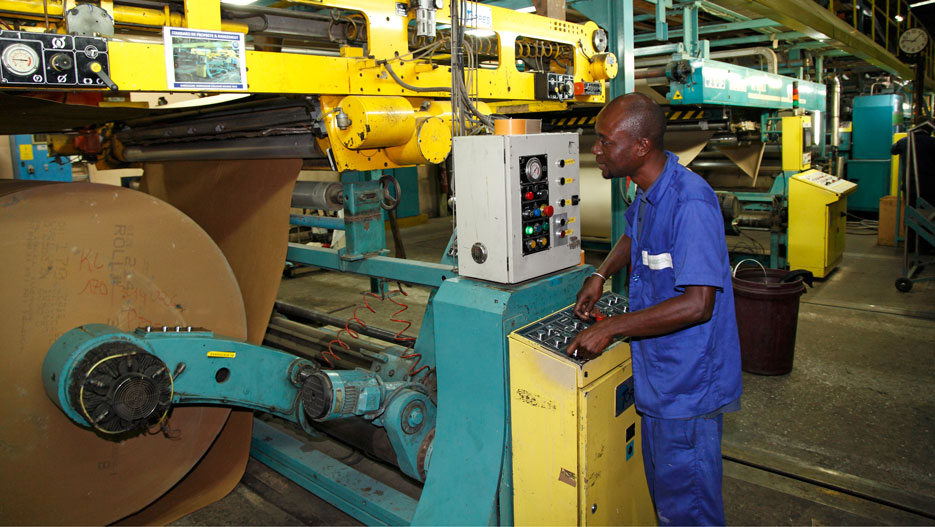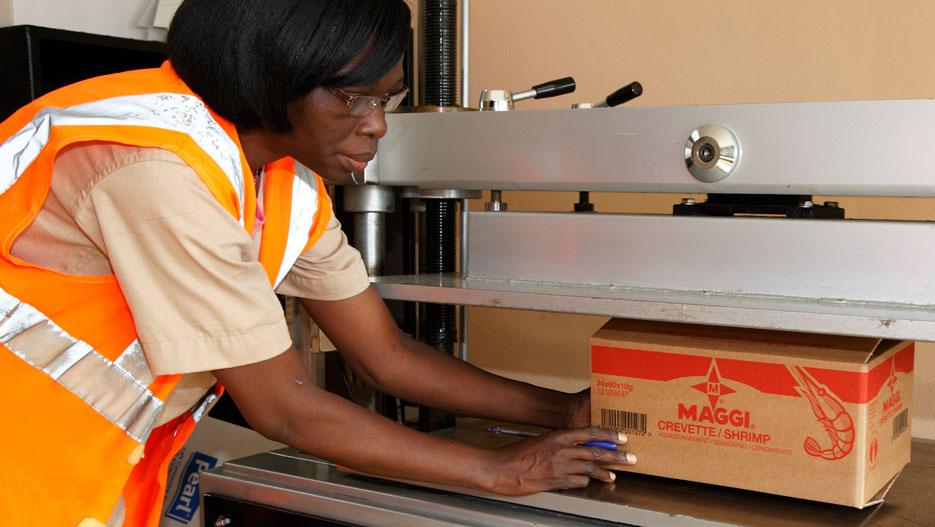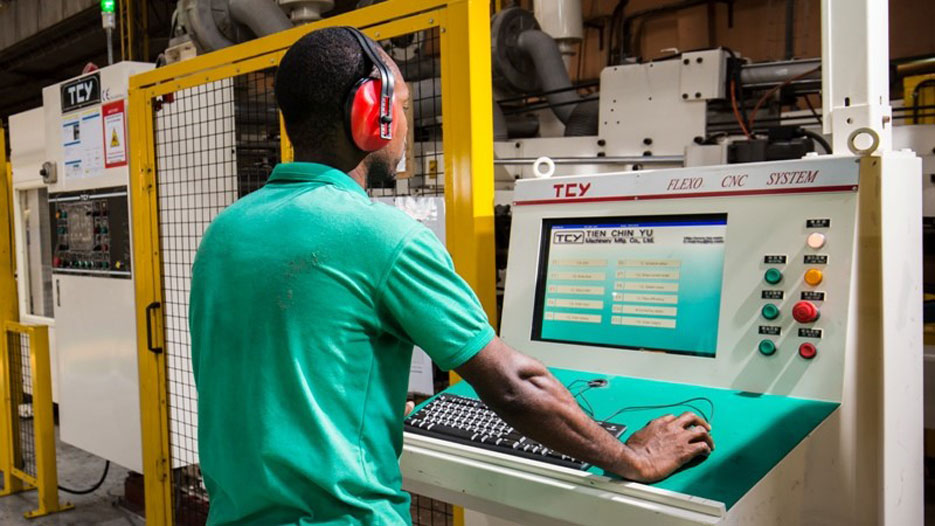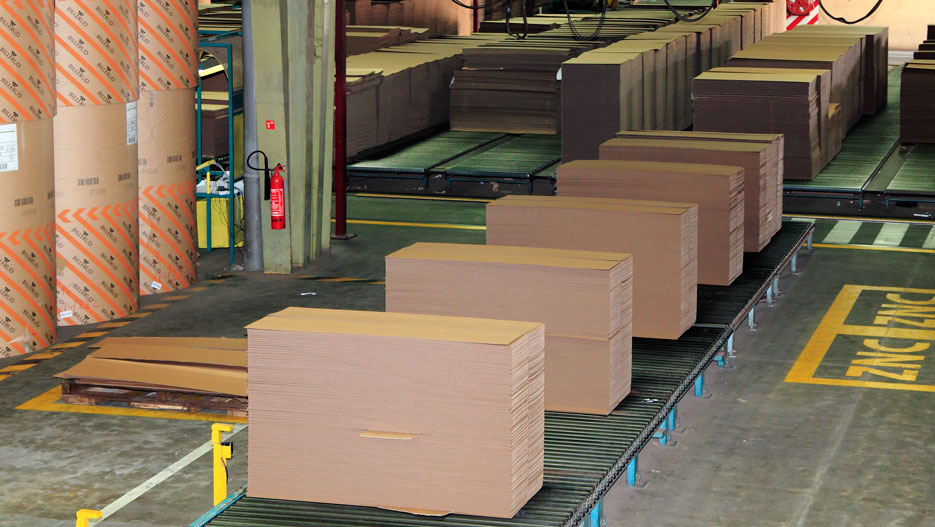SONACO: A Leading Manufacturer of Packaging Solutions in West Africa
Jérôme Meplon talks about the development of the packaging and cardboard sector in Ivory Coast and the subregion, and presents the activities of SONACO and the Rossmann Group, as well as their competitive advantages, policy in terms of social responsibility and goals for the next 2-3 years.
Interview with Jérôme Meplon, Managing Director of SONACO (Rossmann Group)
Could you give us an overview of the packaging and cardboard sector in Ivory Coast and the subregion?
The packaging and cardboard sector is expanding. It is growing because all the packaging is being used directly for consumption. So I think it’s a sector that is developing tremendously, like all the products and markets in Africa. This sector has become vital. We have a product that is essential. Therefore, in terms of manpower and in terms of markets, it is booming. In the coming years, this sector will skyrocket. It also has something to do with the demographics, when you see how much it has boomed in Africa lately. By 2050, there will be more than one billion people on the continent. There will be 250 million people in Nigeria only; so, in the sub-region, we won’t be too far from this figure. These are markets that are going to be huge, including all types of consumer goods, which is one of the markets that is going to develop a lot. We see investors arrive, we see international groups arrive, and we see investment funds that are interested in the standards that have been implemented in the region. Nowadays, Africa is no longer portraying an image of being behind, in terms of personnel and quality. We are very capable here – SONACO has an ISO 9001 certification – and we can make products that are identical to those manufactured in Europe, the United States, South America, or anywhere else in the world for that matter. We have the same criteria, we have the same way of working, and we have people who are increasingly competent. We work a lot on staff training. So, when all these groups and investors see that the market is present, with the demographics to go along with it, and that the purchasing power is increasing, they will notice that these are territories to be conquered. We have been around since 1964 and we will be here to receive them and to show them that anything is possible over here.
In the cardboard sector, are there other manufacturers who can come and establish themselves?
Yes, of course. At the moment, the market must be around 250 thousand tons. In Ivory Coast, there are three economic actors who cover the market, including ourselves, who are very well-established in terms of equipment, know-how and pricing. We are part of an international group; we benefit from the logistics of the Rossmann Group. If another company wants to come over, it has to be sure of its market research before setting up.
Could you tell us more about the Rossmann Group?
The Rossmann Group was created almost 100 years ago in Strasbourg (Alsace). In the beginning, it was a cardboard factory, which grew through acquisitions. Currently, there are 27 entities within the Group: in Romania, Poland, Spain, Belgium, and France (cardboard plants, processing sites, paper mills, etc.). In West Africa, there are 3 entities: one in Ivory Coast called SONACO, another one in Ghana called SONAPACK, and the last one in Burkina Faso called SONACEB. In Africa, we have almost 500 employees.
How are the activities of the group divided among the different entities in the world? What percentage of the overall turnover do you represent in West Africa?
France is the most important country in the Group. As far as SONACO is concerned, we occupy the same position in Africa as, for example, Romania, Poland or Spain. We represent approximately 10% of the total sales.

How do you distinguish yourself in Africa from the other entities in the Group?
At the moment, the market must be around 250 thousand tons. In Ivory Coast, there are three economic actors who cover the market, including ourselves, who are very well-established in terms of equipment, know-how and pricing.
Africa’s particularity is that we are obliged to use a very specific type of paper called Pure Kraft, which we no longer use in Europe, as the focus there is mainly on recycled paper. Pure Kraft comes from Scandinavia and North America. It is what we call a first press. So, it’s paper that is extremely interesting for us because it can resist humidity, as we work in an environment subject to high hygrometry rates. This paper is going to be used to transport fruit – essentially, bananas, pineapple, and mangoes – which are humid products that need to be protected. Besides, when our cardboards arrive in Europe, they are very much sought-after because they are recyclable. Our Pure Kraft cardboards can be recycled 14 times. So, they get shipped a lot. And it’s a product that is 100 % recyclable – therefore, extremely interesting for paper mills in Europe when they need to produce their paper.
But it must be very expensive.
Yes, it’s much more expensive than recycled paper, except that during international negotiations, it’s also interesting for the Rossmann Group to buy Pure Kraft paper from the paper mills, especially since we cover a market in Europe that we shouldn’t be covering – a market composed of bananas and pineapples, and all tropical fruits. Manufacturing cardboards in Europe to send to Martinique, the West Indies, or elsewhere, is not something you would do just for fun. But it’s being done more and more, and our main competition is now cardboard imported from Morocco and Spain.
Your product is suitable for all types of content, such as fruits, manufactured products, etc. You are therefore a barometer of the economic situation of the country and the region, and accompany the development of all these industries. How do you estimate the growth and economic development of Ivory Coast?
Everything that is manufactured is packaged in cardboards, which is why it’s a good economic barometer. When we consume cardboards, it means that there is an economic flow. The more cardboards there are in circulation, the greater the economic flow is. We have adapted fully to this market and we are close to this market. You mentioned a growth of 8 or 9%, whereas ours has been a double-digit growth for the past three years. Each year, we manage to improve. I don’t think it’s due particularly to the development of Ivory Coast, but I think it’s due to the strategy that we have implemented, because we were able to grasp the development of the country. The development of Ivory Coast is not based on some backward-looking vision. It is really based on what will become of Ivory Coast and what will become of Africa. We have learned to anticipate this by buying and investing in extremely sophisticated material which allows us to meet the expectations of the Ivorian and African markets. Gone are the days when we could just take a cardboard and stamp “pineapples” on it and expect people to be satisfied with that. Now, they need the same type of packaging as in Europe in terms of marketing, communication and positioning – with four or five colors, with a checked pattern, with coated paper, with shiny things, etc. The African market is very specific, especially when it comes to distribution, which is still basically handled by wholesalers who come from villages and who tend to stack boxes in their stores. So, it’s important for the industrials to be seen, to be known, to have a packaging that’s extremely striking. And we are asked for more and more sophisticated things that require a lot of investment. The good thing about being in a group such as Rossmann is to have a group that oversees our investment, as these machines are very costly. These are huge investments, and if we didn’t believe in Ivory Coast and Africa, we would never have received support from either the Group or the bankers. Nowadays, the least bit of investment is linked to environment, return on very short-term investment and drastic rates. We have reached a point where things are very specific, and are becoming increasingly so. In fact, Africa has become increasingly specific. The artistic flow that we had known in the past ten years is over now. We have entered a phase of professionalism. It would be unfortunate if an investor were to come along now, thinking that it’s still Neocolonialist Africa. All that is over. We can find skills, we can find talented individuals, Africans who have done their studies here or elsewhere and who are open-minded and brilliant. So, it’s an extremely interesting melting pot.
What type of products do you offer?
In Ivory Coast, we essentially make American boxes, which are boxes with a bottom and a flap, to which we put a tape on it to close it. We can go up to five colors, even in checked pattern, on coated paper. So it’s packaging that is very visible and efficient. And we have just acquired new packaging machines where cardboards are formed directly on the packing line. We are the only ones doing this in Ivory Coast, and perhaps even in the sub-region as well. We have also anticipated that – in other words, we know that new manufacturers who arrive and invest here have a very sophisticated handling chain – with mechanized, pre-formed and anti-theft packaging. We also have a marketing department ready to enter any niche market. We are able to respond to things as astonishing as desks from which to make speeches, totems for supermarkets, or even entire shelves to display products, etc. We have clients, for example, in tuna fisheries, who work for groups like Auchan and Saupiquet. We make a very sophisticated type of packaging for them, which is placed directly on the shelf. Then they remove one side to create a small display for tuna cans. In fact, we can do whatever packaging you find in Europe.
What are your main competitive advantages?
First of all, we have an extremely competent commercial department who will listen to you, to know exactly what you will be using the packaging for. Sometimes we realize that the manufacturers have an exact idea of their product, but the way it is to be transported, stored, etc., is less obvious to them. We make the use of our Research & Development department – which is continually trained by the Rossmann Group – available to our client. We have some computer portals which allow us to continue training and to have them benefit from the R&D department. Besides, the department has access to the technical details of everything that is made by the Group, so it’s interesting. Then, we have the flexibility as well as the productivity that allow us to come out with the packaging very rapidly. Another asset is the 8,000 m2 of storage which allows us to have a stock, to help a client out and be able to respond more precisely to their logistical demands.

How did the demand evolve in the past few years?
Our clients are becoming more and more demanding in terms of standards (environment, traceability, printing quality, etc.), and we no longer have any excuses not to meet those standards. We have regular audits done by some of our clients, such as Nestlé, Cémoi, Cargill, Unilever, Castel and Unifood, to name a few. They also have many quality criteria that are very specific to the food sector, and to which we must attend. Some criteria have to do with the environment, the traceability of our paper – which according to certain norms, goes all the way back to the cutting of the tree – and the sustainable agriculture of the forests which produce the paper. We have to respond to all of that and we are the only ones in the sub-region who are capable of meeting these types of standards.
What is the policy of the company in terms of CSR?
Socially, we are very attached to our employees and their families. We were the only ones for a long time in Ivory Coast to have fully-integrated social services before granting the request of the delegates two years ago for a third-party payment card, etc. But we realized that the social services we set up ourselves were more interesting. We have a clinic; we have doctors for the families. We have a canteen for the workers. We have access to lodging for the workers who want it, and we are very present, in terms of corporate responsibility, in organizations such as SOS Villages d’Enfants (SOS Villages for Children), with sports clubs, and especially with the National Training Center of Ivory Coast, which is linked to the Ministry of Culture, where we work a lot with digital books. Our goal is to form a pool of competent Ivorian people. We have launched a major apprenticeship campaign to train our staff, as we currently lack qualified staff. The high-level positions are occupied by highly qualified personnel, but in the technical field, we find it much more difficult to find well-trained people. Ivory Coast has experienced difficulties in the past, which may have created shortcomings in the field of human resources, but today we find people who are passionate, motivated and eager to learn.

Human Resources are faced with these challenges in all the sectors.
Absolutely. We even train the teachers of the technical high school of Yopougon. As part of their internship within our company, they re-learn the realities of modern industry. We are certified by the National Training Center of Ivory Coast to upgrade them in electricity, printing, etc.
Can you talk a bit about Rossmann’s activities in Ghana and Burkina Faso?
The Burkina Faso subsidiary was created in 1985-1986, along with SONACO in Yopougon. It is an advanced post of SONACO. Our colleagues in Burkina Faso have processing tools to produce packaging from corrugated boards we deliver to them. Initially, the market in Burkina Faso was limited and focused mainly on green beans, mangoes or manufactured products such as cigarettes. But it was important for us to be present in this market. We are based in Bobo-Dioulasso and employ about 30 people. In Ghana, the subsidiary was born seven years ago, after a company buyout. The events of the past few years and inflation have created an extremely difficult context. But the situation is improving. We invest a lot in our production tools and have 150 people on site.
You also export to Togo and Benin, right?
Our exports to Togo and Benin are carried out by the Ghanaian subsidiary to limit distances. Indeed, the weight-to-volume ratio of the corrugated board results in high transport costs, since it contains a lot of air. Containers with which we work can only receive 6 tons of corrugated board, compared to 24 tons of paper. In order to limit costs, we export to these two countries from Ghana. In Ivory Coast, we work with Burkina Faso and especially with Mali, where we provide packaging to mango producers from February to April, as well as the factories – our packaging is used to pack pasta, mineral water, oil, coffee. Mali is currently experiencing a very important development in terms of consumption.

Are you open to partnerships with other companies, such as joint ventures, acquisitions or equity investments?
Not really, because we are part of a group. It’s a family-owned group and with capital that is solely family-based. There are no other shareholders aside from the Rossmann family in the Rossmann Group. There are no ties with other companies, investors, or specific partnerships. These are people who have their own equity and investment.
To conclude, how do you envision the development of your business in West Africa in the next 2-3 years?
SONACO and the Rossmann Group in Africa will certainly continue to grow steadily at double digits. The company will benefit from new investments from the group, including the construction of new storage buildings. We are increasingly focusing on the agribusiness sector, whose products are always more precise and high value-added. To meet these needs, we will continue the modernization of our packaging and packaging stations. The handling chain will become standard. I am therefore optimistic and expect a good growth of the company over the next five years. Ivory Coast will be the leading figure, followed by Ghana, whose situation is improving considerably thanks to the strategies put in place by the Rossmann Group in West Africa. We even plan to set up a new processing structure in the subregion to cover other markets. So we are on a good path!
ABOUT :
WEBSITE: www.rossmann.com
BIOGRAPHY:
• Jérôme Meplon – Biographie
INTERVIEW (French version):
• SONACO : Un Leader du Secteur des Emballages et du Carton en Afrique de l’Ouest
VIDEOS:
• Industrie des Emballages et du cardboard en Côte d’Ivoire et en Afrique de l’Ouest
• Groupe Rossmann : Le Spécialiste de l’Emballage en cardboard Ondulé
• Jérôme Meplon : Développement de la Côte d’Ivoire et de l’Afrique
• SONACO : De la Caisse Américaine aux Emballages Mécanisables, Préformés et Antivols
• Secteur des Emballages en Ivory Coast : Avantages Concurrentiels de SONACO
• Responsabilité Sociétale de SONACO et du Groupe Rossmann
• Développement de SONACO et du Groupe Rossmann en Afrique
COMPANY PROFILE:
• Rossmann Group: A Leading Manufacturer of Packaging Solutions in Europe and Africa